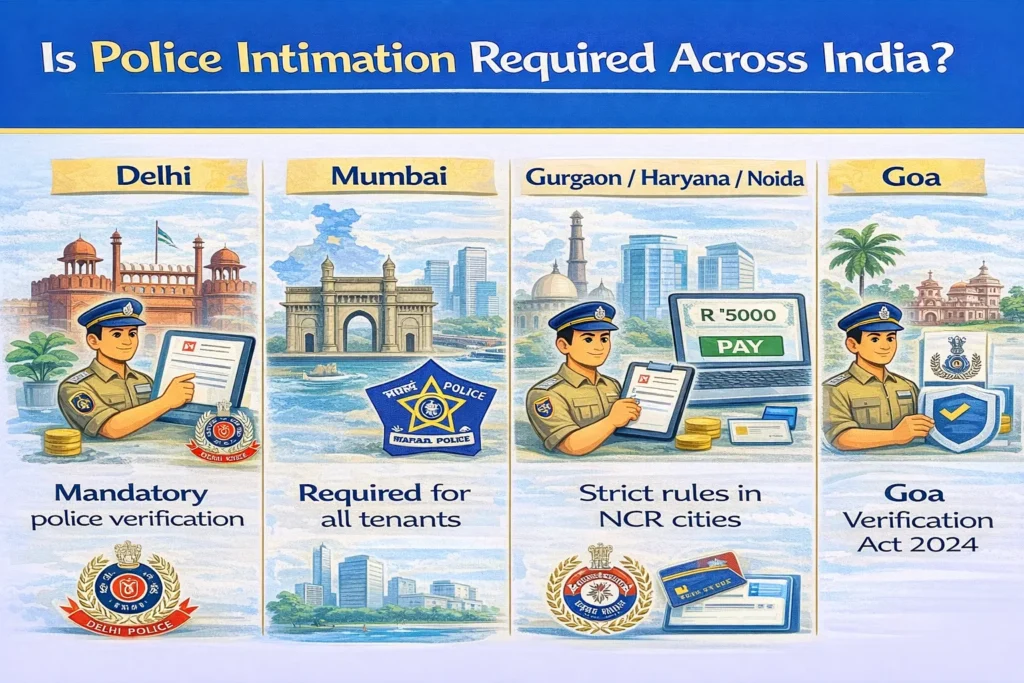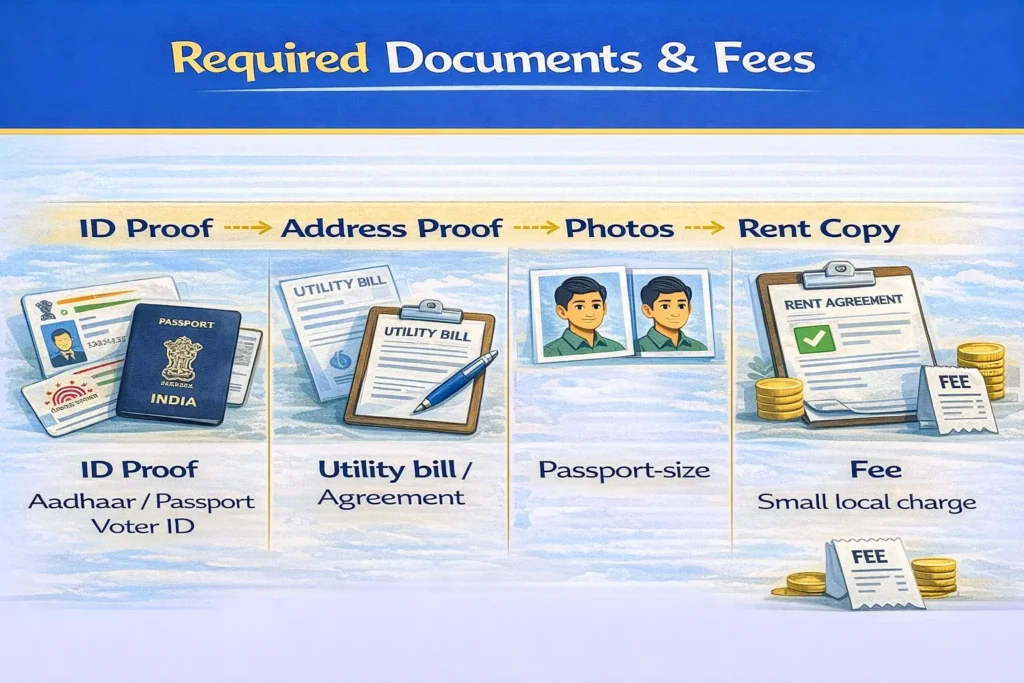
Police Intimation for Tenants: Is It Needed?
Renting a property in India comes with its own set of legal obligations and procedures. One such procedure that often raises questions is police intimation for tenants. This process, also known as tenant police verification, is crucial for both landlords and tenants to ensure safety and compliance with the law. In this comprehensive guide, we will delve into the details of police intimation for tenants, its legal framework, city-specific requirements, and the consequences of non-compliance.
What Is Tenant Police Intimation (Tenant Verification)?
Tenant police intimation, commonly referred to as tenant verification, is a process where landlords or property owners inform the local police about the details of their tenants. This process involves submitting personal information of the tenant, such as their name, address, identification proof, and other relevant details, to the police for verification.
The primary objective of tenant verification is to ensure the safety and security of the community. By verifying the background of tenants, the police can keep track of individuals residing in a particular area, which helps in maintaining law and order. This process is particularly important in urban areas where the population density is high, and the risk of criminal activities is relatively greater.
Legal Framework: Section 188 IPC & State Laws
The legal framework for tenant police verification in India is primarily governed by Section 188 of the Indian Penal Code (IPC). This section deals with disobedience to an order duly promulgated by a public servant. According to Section 188, if a landlord fails to comply with the police verification process, they can be held liable for disobedience, which is a punishable offense.
In addition to Section 188 IPC, various states in India have their own specific laws and regulations regarding tenant verification. These state-specific laws often provide detailed guidelines on the procedure to be followed, the documents required, and the penalties for non-compliance. It is essential for landlords and tenants to be aware of both the central and state-specific laws to ensure full compliance.
Is Police Intimation Required Across India?

The requirement for police intimation for tenants varies across different cities and states in India. While some cities have made it mandatory, others have more relaxed regulations. Let’s take a closer look at the requirements in some of the major cities:
Delhi
In Delhi, tenant police verification is mandatory. The Delhi Police has a well-established procedure for tenant verification, which can be completed both online and offline. Landlords are required to submit the tenant’s details to the local police station within a specified time frame. Failure to comply with this requirement can result in penalties and legal consequences.
Mumbai
Similar to Delhi, Mumbai also has strict regulations regarding tenant police verification. The Mumbai Police has an online portal where landlords can submit the tenant’s details for verification. The process is straightforward and aims to ensure the safety and security of the residents. Non-compliance with the verification process can lead to legal action against the landlord.
Gurgaon / Haryana / Noida
In Gurgaon, Haryana, and Noida, tenant police verification is also mandatory. The local police authorities have specific guidelines and procedures for tenant verification. Landlords are required to submit the tenant’s details to the nearest police station or through the online portal. Failure to comply with the verification process can result in penalties and legal consequences.
Goa (Goa Verification Act 2024)
Goa has recently introduced the Goa Verification Act 2024, which mandates tenant police verification for all rental properties. The act provides detailed guidelines on the procedure to be followed, the documents required, and the penalties for non-compliance. Landlords in Goa must ensure that they comply with the provisions of this act to avoid legal consequences.
Online vs. Offline Verification: How to Comply
The process of tenant police verification can be completed both online and offline, depending on the city and state regulations. Here’s a detailed look at both methods:
Online Verification
Online verification is a convenient and efficient way to comply with the tenant police verification process. Many cities, such as Delhi, Mumbai, and Gurgaon, have online portals where landlords can submit the tenant’s details for verification. The process typically involves the following steps:
- Registration: Landlords need to register on the official police portal of their respective city.
- Submission of Details: Once registered, landlords can submit the tenant’s details, including their name, address, identification proof, and other relevant information.
- Verification: The police authorities will verify the submitted details and conduct a background check on the tenant.
- Approval: Upon successful verification, the police will approve the tenant’s details, and the landlord will receive a confirmation.
Offline Verification
In some cities, the tenant police verification process can also be completed offline. This involves visiting the local police station and submitting the tenant’s details in person. The process typically involves the following steps:
- Visit the Police Station: Landlords need to visit the nearest police station and obtain the tenant verification form.
- Submission of Details: The landlord needs to fill out the form with the tenant’s details and submit it along with the required documents.
- Verification: The police authorities will verify the submitted details and conduct a background check on the tenant.
- Approval: Upon successful verification, the police will approve the tenant’s details, and the landlord will receive a confirmation.
Required Documents & Verification Fees

The documents required for tenant police verification may vary depending on the city and state regulations. However, some of the common documents include:
- Identification Proof: Aadhar card, passport, voter ID, or any other government-issued identification proof.
- Address Proof: Utility bills, rental agreement, or any other document that serves as proof of address.
- Passport-sized Photographs: Recent passport-sized photographs of the tenant.
- Rental Agreement: A copy of the rental agreement between the landlord and the tenant.
In addition to the documents, there may be a nominal fee for the verification process. The fee amount varies depending on the city and state regulations.
Consequences of Non-Compliance
Failure to comply with the tenant police verification process can result in severe consequences for landlords. Some of the potential consequences include:
- Legal Action: Landlords can be held liable under Section 188 IPC for disobedience to an order duly promulgated by a public servant. This can result in legal action and penalties.
- Penalties: Non-compliance with the verification process can lead to monetary penalties imposed by the local police authorities.
- Eviction: In some cases, non-compliance with the verification process can result in the eviction of the tenant and the landlord being held responsible for any legal consequences.
FAQs
Can a tenant initiate verification themselves?
In most cases, the responsibility of initiating the tenant police verification process lies with the landlord. However, some cities may allow tenants to initiate the process themselves. It is essential to check the local regulations and guidelines to determine the specific requirements.
How long does the verification process take?
The duration of the tenant police verification process can vary depending on the city and state regulations. In some cases, the process can be completed within a few days, while in others, it may take several weeks. It is advisable to initiate the process well in advance to avoid any delays.
What if the tenant has expired visa or ID?
If the tenant has an expired visa or identification proof, it is essential to address this issue before initiating the verification process. Landlords should ensure that the tenant’s documents are valid and up-to-date to avoid any complications during the verification process.
Best Practices and Pro Tips for Landlords & Tenants
To ensure a smooth and hassle-free tenant police verification process, here are some best practices and pro tips for both landlords and tenants:
For Landlords:
- Stay Informed: Keep yourself updated with the latest regulations and guidelines regarding tenant police verification in your city.
- Initiate Early: Initiate the verification process well in advance to avoid any last-minute delays.
- Maintain Records: Keep a record of all the documents and details submitted for verification.
- Communicate Clearly: Clearly communicate the verification process and requirements to your tenants to ensure their cooperation.
For Tenants:
- Provide Accurate Information: Ensure that all the information and documents provided for verification are accurate and up-to-date.
- Cooperate with the Landlord: Cooperate with your landlord and provide all the necessary details and documents required for the verification process.
- Follow Up: Follow up with your landlord and the police authorities to ensure that the verification process is completed smoothly.
Conclusion
Police intimation for tenants, or tenant police verification, is a crucial process that ensures the safety and security of the community. While the requirements and procedures may vary across different cities and states in India, it is essential for both landlords and tenants to comply with the regulations to avoid legal consequences. By staying informed and following the best practices, landlords and tenants can ensure a smooth and hassle-free verification process.
Pryank Agrawal is the Founder and CEO of Housewise, a leading property management startup serving customers across 45 countries with operations in 22 Indian cities, including Pune, Bengaluru, Hyderabad, Chennai, Delhi NCR, and Mumbai. An engineering graduate from IIT Roorkee, Pryank brings extensive experience from the software industry. His passion for leveraging technology to solve real estate challenges led him to establish Housewise, simplifying property management for homeowners worldwide. After persistent requests from existing customers to address other challenges faced by Non-Resident Indians, he founded MostlyNRI, a dedicated portal assisting NRIs with taxation and financial asset management in India.
